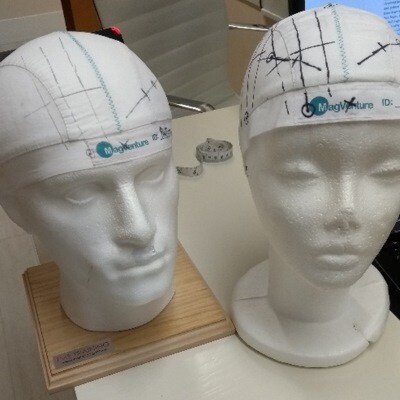An Insight into rTMS Technician Training
November 7, 2017 - Smart TMS

by Isabel Leming, TMS Technician
Isabel Leming shares her experience of training at Smart TMS London, giving an insight into her experiences with the Transcranial Magnetic Stimulation clinic.
She shares her training journey along with impressions of the treatment, the patients and the company behind the innovative non-invasive treatment for mental health conditions.
“For the last three weeks I have begun training and working as a TMS technician for Smart TMS, a healthcare clinic in London. I started with a good knowledge base on what TMS was and how it can be used to modulate activity in the brain, but I had little experience in using the TMS machine to treat patients.
TMS Training, London
“My training began with learning how to obtain certain head measurements and then using these measurements to locate the specific areas of the brain implicated in each separate condition treated. This was done using a couple of polystyrene heads (a female head named Michelle and a Male named Herman), to practice on.
“I also learnt how to determine each individual’s resting motor threshold (which is used to work out what the maximum power output of TMS we can administer to each patient is). For this I involved various health advisors and administrators from the clinic, sat them down in a chair and administered a single pulse of TMS over their motor cortex, so I could see their fingers twitching slightly – something I am sure they were all bored of by the end of the week.
“The last stage of training focused on how to correctly place the coil on the patient’s head and actually using the TMS machine itself. This felt like the longest process of the training – moving the arm of the coil and adjusting it to the right angle and position for each patient took longer to master than I thought. Being quite short, I struggled to see the top of coil when the patient was sat in an upright position, making it difficult to get the angle and placement right. Accepting my shortcomings in the height department, I joked with the idea of getting a step, but I soon realised that this issue was easily fixed by just lowering the bed!
First TMS Treatments
“Now that I was comfortable and confident with the TMS machine, I was independently able to run the sessions with patients.
“As rTMS is still a reasonably new treatment, I find that the fear of the unknown is especially prominent when patients come in for their first session in the clinic. Many are very anxious, nervous and unsure about what they are going to experience and how it might feel to them. I show them the machine, talk through how it works, what the process is and I usually administer a low level pulse, so that they know what to expect from the treatment – what it sounds like, how it feels etc. It is usually very apparent which patients are more apprehensive and nervous than others, so I spend more time reassuring these patients and answering questions to ease any further anxieties. I will often have a joke with them so they feel comfortable, but I also give them some information on my neuropsychological background so they feel they can trust me. For some, they can still feel anxious about the treatment after the first session, but this tends to ease as we progress through the treatment and as they become more familiar with everything.
“Once I have met the patient two or three times, I find it easier to gage their mood and any signs that their symptoms are improving. With the depression patients in particular, their body posture, eye contact, talkativeness and volume often give away within the first few seconds how they are feeling on that particular day. Similarly, different patients like to manage and handle their treatment sessions in different ways. Whilst some prefer to relax and see it as an opportunity to lie down, others prefer to converse in order to take their minds off of the treatment.
“Whilst the most common condition we are currently treating is depression, we are also treating patients for anxiety, OCD, depersonalisation disorder and cocaine addiction.”
 Isabel Leming, TMS Technician
Isabel Leming, TMS Technician
Isabel joins the Smart TMS team after a range of experience and training which includes:
- Behaviour Support Worker, North Bristol NHS Trust, working on a neurology/stroke ward
- Role Play Therapist, behavioural outreach service and learning support within education
- Researcher at The University of Glasgow
- Research masters in Brain Sciences, 2015, The University of Glasgow
- Bachelor of Science (BS) in Psychology and Sport, 2014, The University of Stirling
For more information about our team, Meet the TMS Technicians.
Smart TMS
Smart TMS was established in 2015, dedicated to providing TMS treatment in London at their South Kensington/Brompton Cross centre. The company opened a second clinic in Birmingham in September 2017 and a third in Dublin in October 2017. Smart TMS is planning further locations for Manchester and Bristol in 2018.
CONTACT US
For any other queries or for patients wishing to book an appointment at one of our UK clinics, please contact us:
Tel: 0345 222 5678
Email: info@smarttms.co.uk
Irish patients may contact Our Dublin Clinic direct on:
Email: info@smarttms.ie
Tel: 353 (01) 254 2514
Website: www.smarttms.ie










